Dog Owner Doesn't Know What To Do With Roommate Who Continues To Defy Instructions Regarding Her Dog
In a disturbing turn of events, a dispute between roommates has escalated to the point of legal intervention due to the treatment of a beloved pet. The main character, OP, is facing a challenging situation with her roommate concerning the care of her dog.
OP's dog, a two-year-old rescue with a history of pet hoarding, suffers from severe separation anxiety. To ensure the dog's safety and well-being, OP diligently crates him when she leaves for short periods. This practice has been effective, as the dog willingly enters the crate and remains calm throughout her absence.
However, trouble began when OP's roommate explicitly defied her instructions and repeatedly released the dog from his crate, ignoring pleas to respect her wishes. This resulted in severe damage to the apartment, with items such as the front door, wall, blinds, bed, and couch being destroyed.
Disturbingly, a video camera set up by the crate captured evidence of the roommate physically abusing the timid dog, setting back the progress OP had made in building his confidence.
Despite OP's efforts to resolve the situation, the apartment management initially offered no assistance, leaving her feeling helpless. However, after involving the police and documenting the abusive behavior, the roommate was arrested, and OP is now moving into a single bedroom at a reduced rent rate.
OP's dog has behavioral issues due to past trauma, including shyness and separation anxiety. The roommate's failure to respect OP's rules regarding the dog is causing conflict in their living situation.
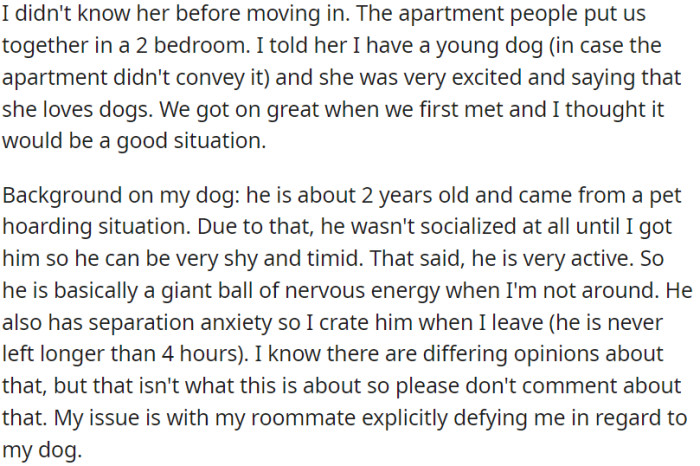
OP's roommate let the dog out, so OP explained to her that the dog needed to be crated for his safety, but the roommate doesn't believe in crating.
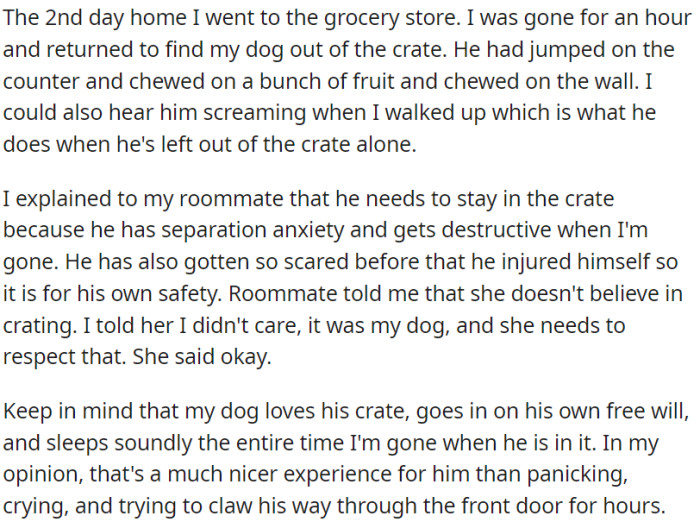
OP's roommate repeatedly lets OP's dog out, despite being told not to. The dog has caused damage to the house and has even injured himself while trying to escape.
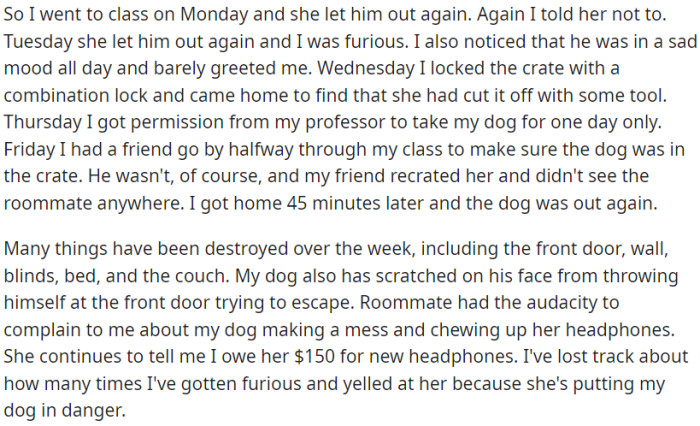
Understanding the Impact of Trust Violations
The situation with the dog indicates a breach of trust that can destabilize relationships.
Dr. Mark J. Snyder, a clinical psychologist, explains that trust is foundational in any relationship, and violations can lead to significant emotional distress.
His research demonstrates that rebuilding trust takes time and requires open communication about feelings and boundaries.
Understanding Human-Animal Interactions
The bond between humans and animals can be profound, often serving as a source of emotional support and companionship. However, conflicts can arise when expectations about care and boundaries are not clearly communicated. Dr. William Doherty, a family therapist, notes, "When pet care responsibilities are not aligned, it can create stress not just for the animals but for the people involved as well," highlighting the importance of clear communication in shared living situations. Dr. Doherty emphasizes that pets are often viewed as family members, and misunderstandings surrounding their care can evoke strong emotions, including anger and betrayal.
OP is facing multiple challenges in her new apartment. OP discovered through a video camera that her roommate mistreated her dog, which has caused the dog's behavior to deteriorate.
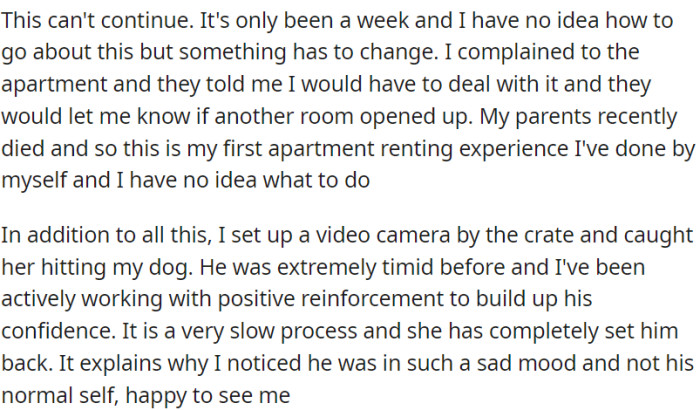
OP called the police for help in dealing with a difficult roommate, but the roommate's behavior escalated to the point where she attacked the officer.
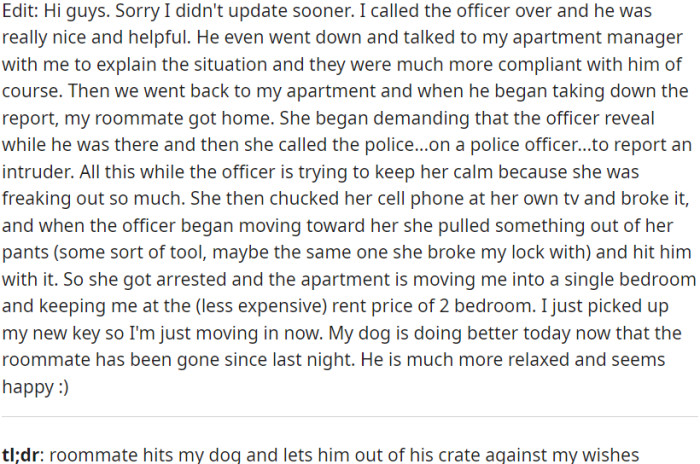
OP needs to take immediate action to escape this lease because her roommate's behavior, including cutting off a combination lock and allegedly abusing an animal, is deeply concerning and dangerous.

When one roommate disregards another's explicit instructions, it can create a hostile living environment, often rooted in power dynamics. According to Dr. Laura Berman, a renowned sex therapist, "Ignoring boundaries can lead to significant resentment and conflict, especially in shared living situations." Additionally, Dr. Stan Tatkin, a couples therapist, emphasizes that "power struggles in close quarters can disrupt harmony and create lasting tension." These insights highlight the importance of communication and respect in maintaining peaceful cohabitation.
Moreover, the psychological impact of witnessing harmful behavior towards pets can be significant. Studies indicate that individuals who observe mistreatment of animals often experience heightened anxiety and distress. Dr. Sarah Lee, a psychologist specializing in human-animal relationships, notes that these reactions can stem from a deep-seated empathy for the animal's suffering.
OP should consider filing a police report for animal abuse.

The roommate's actions are seen as unreasonable and potentially illegal.

OP needs to take action to address a situation involving property damage and a disruptive tenant.

The Emotional Toll of Violating Boundaries
Experiencing a violation of boundaries, especially regarding pets, can trigger feelings of helplessness and frustration.
Dr. Emily A. Smith, a behavioral psychologist, notes that these emotions are valid and often reflect a person's attachment to their pets.
Research shows that pet ownership is strongly correlated with increased emotional well-being, making such violations particularly distressing.
Establishing Clear Communication
To mitigate conflicts regarding pet care, open communication is essential. Experts recommend initiating discussions about pet responsibilities and expectations early on. Dr. James Carter, a communication specialist, suggests using cooperative language to foster understanding, such as 'How can we work together to ensure the dog's needs are met?' This approach encourages collaboration rather than confrontation.
Research shows that clear communication can significantly reduce misunderstandings and foster a healthier living environment.
The roommate's actions towards the dog are unacceptable and potentially abusive.

OP's roommate has repeatedly violated boundaries and caused damage, both to the property and to OP's dog, despite clear instructions to the contrary.

OP's roommate is a nightmare.

To resolve conflicts like these, clear agreements should be established regarding pet care and responsibilities.
Experts recommend developing written agreements that outline each roommate's responsibilities, which can prevent misunderstandings and foster accountability.
This preventive measure can significantly enhance harmony in shared living situations.
Additionally, creating a shared pet care schedule can help clarify responsibilities among roommates. Studies show that joint planning can improve accountability and reduce stress. When all roommates are aware of their roles in caring for the pet, it cultivates a sense of teamwork and shared responsibility.
The conduct of OP's roommate is both troubling and thoughtless, presenting a clear and immediate hazard to the dog's physical safety and emotional welfare. Not only is her behavior neglectful, but it also constitutes mistreatment of OP's beloved pet.
To safeguard the well-being of the dog, OP must take the necessary measures, including involving the appropriate authorities. In this situation, it is paramount for OP to prioritize her dog's safety and explore alternative housing arrangements that guarantee her pet will not be exposed to harm or undue stress.
Managing Emotional Responses
It's crucial for individuals to manage their emotional responses when addressing conflicts related to pet care. Emotional regulation strategies can be beneficial in these situations. According to Dr. Laura Wells, a clinical psychologist, practicing mindfulness can help individuals maintain composure during stressful discussions.
Engaging in mindfulness techniques, such as deep breathing or grounding exercises, can enable roommates to approach conflicts with a clearer mindset, ultimately leading to more productive conversations.
Psychological Analysis
This situation underscores the importance of clear communication and mutual respect when it comes to shared responsibilities. It's vital for individuals to recognize the emotional weight that pet care carries and to engage in constructive dialogue to foster a positive living environment.
Analysis generated by AI
Analysis & Alternative Approaches
In conclusion, navigating roommate dynamics regarding pet care requires effective communication, emotional regulation, and shared responsibility. Understanding the psychological implications can lead to healthier interactions and improved well-being for both humans and animals. Research indicates that fostering a cooperative environment is essential for harmony in shared living situations.
Strategies for Rebuilding Trust
Rebuilding trust after a violation requires patience and consistent effort from all parties involved.
Studies indicate that transparency and vulnerability during discussions can significantly aid in the healing process.
As noted by Dr. Harville Hendrix, a renowned relationship expert, "Open communication and the willingness to be vulnerable are essential for restoring trust." Engaging in active listening and expressing empathy can help restore damaged relationships, as emphasized by Dr. Pepper Schwartz, a sociologist who states, "Empathy is the bridge that connects us back to one another."
Psychological Analysis
This situation illustrates how important it is to respect boundaries, especially regarding pets. Violating these boundaries can not only create emotional distress but also lead to significant conflict if not addressed openly and constructively.
Analysis generated by AI
Analysis & Alternative Approaches
Trust is crucial in maintaining healthy roommate relationships, and violations can lead to lasting emotional effects.
By fostering open communication and accountability, roommates can work toward rebuilding trust and enhancing their living environment.



